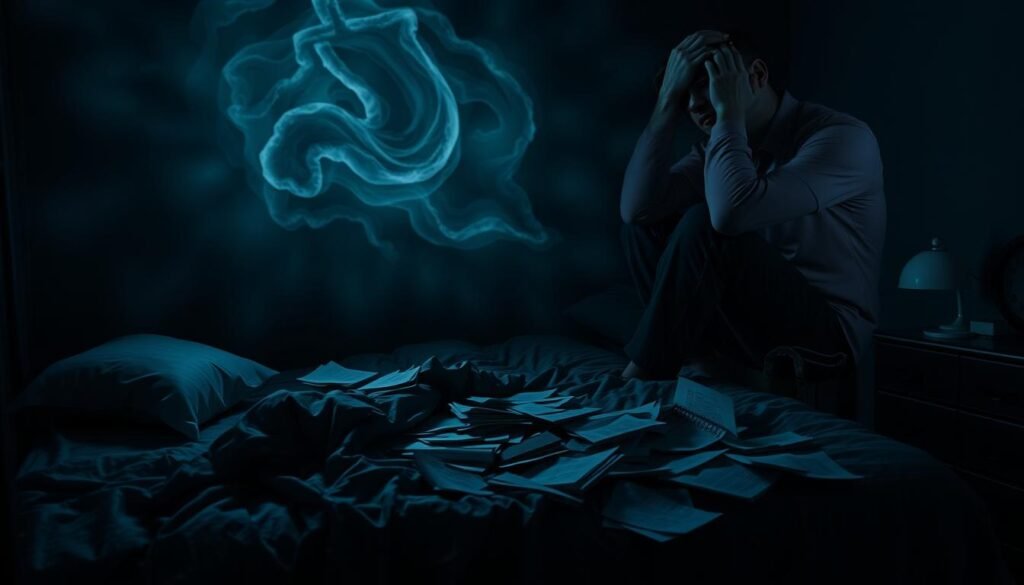It may be shocking, but about 70 million Americans battle with insomnia. This sleep disorder doesn’t just make it hard to sleep. It also can lead to health problems, including the issue of whether insomnia causes nausea. The connection between losing sleep and body functions is clear. Side effects of insomnia, like nausea, fatigue, and irritability, show this link.
Sleep quality going down means our body struggles more with hormones and stress. This can mess up our digestion and stomach health. Sleep loss can actually cause inflammation to go up and cortisol levels to rise, hurting our stomach lining. To really get why poor sleep might make us feel nauseous, it’s important to look at how insomnia affects us. If you want more on how sleep loss links to nausea, check this resource.
Key Takeaways
- Insomnia troubles around 70 million Americans, showing poor sleep’s link to health issues like nausea.
- Sleep problems can cause more inflammation, affecting our digestive health.
- Lack of sleep can raise cortisol, which may hurt our digestive system.
- Insomnia and upset stomachs may be related through gut microbiome problems.
- Better sleep routines can help with nausea caused by not sleeping enough.
- Managing stress better can make our sleep quality go up and reduce nausea.
Understanding Insomnia and Nausea
Insomnia is a common sleep disorder that makes it hard to fall or stay asleep. People with insomnia might wake up too early and not feel rested. Symptoms include being very tired during the day, feeling irritable, and having trouble focusing. Insomnia can last for a short time or be a long-term issue.
Nausea feels like you are about to throw up. It’s often linked to insomnia. When you don’t sleep enough, you might feel nauseous. This is because lack of sleep can mess with your immune system. This can make you feel sick to your stomach.
Not sleeping enough can increase inflammation in your digestive system. This can make nausea worse. Poor sleep can also make you crave junk food and depend more on caffeine. These habits can make nausea worse too. Getting better sleep by following a regular schedule and staying hydrated can help reduce these issues.
Insomnia might be caused by stress, big changes in life, your environment, or mental health problems. Dealing with these root causes can improve your sleep. This can also help decrease feelings of nausea.
For helpful information on treating sleep disorders, check out this resource.
How Sleep Deprivation Affects the Body
Sleep deprivation impacts mental and physical health. It is linked to 20% of all vehicle crashes. The health issues from insomnia include mood swings, headaches, and stomach problems.
Staying awake too long hurts your performance. Being up for 17 hours is like having a blood alcohol level of 0.05%. After 24 hours, it’s similar to 0.10%, over the legal driving limit. This impairs decision-making and cognitive abilities, affecting everyday tasks.
Adults need 7 to 8 hours of sleep for their best performance. Still, a third of U.S. adults sleep less than needed. Causes include long work hours, responsibilities, and screen time before bed. This lack of sleep can lead to chronic diseases like obesity, diabetes, and heart problems.
| Duration of Wakefulness | Equivalent BAC | Potential Effects |
|---|---|---|
| 17 hours | 0.05% | Impaired decision-making, fatigue, and nausea |
| 24 hours | 0.10% | Severe cognitive impairment, mood swings, and increased accident risk |

Sleep deprivation harms long-term health. It weakens the immune system and makes you prone to sickness. It also tosses hormone levels off balance. Emotional issues, like anxiety and mood swings, may worsen. Thus, treating sleep problems early on is crucial.
Does Insomnia Cause Nausea
Looking into how lack of sleep and nausea are connected shows some shocking truths. Studies show that not sleeping enough can start a chain of symptoms. This affects your digestion and how you feel overall.
Connection Between Sleep Loss and Digestive Disturbances
Not getting enough sleep can make your immune system too active. This leads to more pro-inflammatory cytokines being made. This inflammation can hurt your digestive organs, causing issues like nausea. Does insomnia cause nausea? Research links it to more gut disorders, such as IBD and IBS. If you don’t sleep enough, it might make these problems worse, causing more discomfort.
Scientific Studies Linking Sleep and Nausea
Many studies have found a clear connection between bad sleep and stomach disorders. Lack of sleep increases the risk of Crohn’s disease, GERD, and ulcers. In the U.S., around 70 million people struggle with insomnia. This problem often leads to wanting more food or eating junk. Improving how you sleep can help ease these symptoms. You can learn more about it from this source.

Common Symptoms of Insomnia
People with insomnia often feel very tired during the day. This tiredness leads to less energy and motivation. It can make them feel irritable and stressed. This stress makes it harder to sleep, starting a difficult cycle.
It’s hard for them to focus, which affects their work and daily tasks. Being tired all the time makes these problems worse.
Insomnia also affects emotions, making people feel more stressed. It’s important to know how sleep problems can make you feel anxious or sad. This understanding helps in dealing with insomnia better.
Not sleeping enough can also cause stomach problems. It can change how your digestive system works, leading to nausea and discomfort. This shows how sleep issues are linked to other health problems. To learn more about sleep and stomach health, check out this informative article.

| Symptom | Description | Associated Condition |
|---|---|---|
| Fatigue | Chronic tiredness affecting daily activities | Insomnia |
| Irritability | Increased mood swings and irritability | Insomnia |
| Concentration Issues | Difficulties with focus and mental clarity | Insomnia |
| Emotional Instability | Heightened feelings of stress and anxiety | Insomnia |
| Nausea | Possible gastrointestinal discomfort due to disrupted sleep | Chronic Sleep Deprivation |
How Lack of Sleep Leads to Nausea
Sleep is vital for health, and not getting enough can affect our bodies. Nearly 70 million people in the U.S. have trouble sleeping. This often leads to health problems. One issue people face when they don’t sleep enough is nausea. This happens because not sleeping well messes with our gut health.
Impact on Gut Health
When we don’t sleep, it throws off our gut’s balance. This can cause stomach issues and raise the risk of discomfort. Studies have linked not sleeping enough with feeling sick to your stomach. Not sleeping well for a long time makes bad molecules build up in the gut. This can make nausea worse. Getting enough sleep helps keep our gut working right.
Making changes to what we eat could help with nausea, too. Drinks like Sprite might help for a short time. But things like coconut water or chamomile tea could be better long-term options.
Role of Stress in Insomnia and Nausea
Stress and not sleeping seem to go hand in hand, making each other worse. Stress can make the body react in ways that lead to stomach issues. It’s important to know how stress and sleep affect each other. Understanding this can help tackle the problems of insomnia and nausea.
Finding ways to reduce stress can help improve sleep and reduce nausea. Relaxation techniques can be a good way to break the cycle of not sleeping and feeling sick.
For more details on how sleep, stress, and gut health are connected, look into resources like studies on insomnia and nausea. These can give deeper insights into the issue.
Fatigue and Nausea: The Vicious Cycle
Insomnia often results in a tough cycle of fatigue and nausea. Sleep problems can lead to severe tiredness, which may increase the risk of feeling nauseous. Stress also plays a key role, making the cycle of insomnia, fatigue, and nausea hard to break.
When you don’t sleep enough, your body doesn’t work as it should. High stress hormone levels can make you feel both tired and nauseous. Plus, poor sleep hurts your digestion, making insomnia and nausea worse. As you become more tired, it’s harder to find ways to get out of this cycle.
To manage this issue, it’s critical to understand the cycle well. Here’s a closer look at how this cycle affects us:
| Aspect | Impact |
|---|---|
| Fatigue | You get easily annoyed, have trouble thinking clearly, and there’s a higher chance of accidents. |
| Nausea | It can make you lose your appetite, lead to stomach problems, and make you even more tired. |
| Stress | Makes you feel more tired and can cause nausea, keeping insomnia going. |
| Sleep Quality | Not sleeping well can lead to serious health problems, including more tiredness and nausea. |
To break the cycle of insomnia and nausea, you need a plan that tackles different issues. This could include using ways to reduce stress, better sleep habits, and drinking more water to help with nausea. Fixing these related problems is key to getting back to feeling good.
Managing Nausea Related to Insomnia
Nausea often troubles those with insomnia, making everyday life harder. Simple steps can make a big difference in handling it. Changing what you eat and drinking more liquids can lessen discomfort. This boosts your health.
Dietary Adjustments to Alleviate Nausea
Smart food choices are key to controlling nausea. Choose mild foods like:
- Plain toast
- Rice
- Bananas
- Applesauce
- Boiled potatoes
These foods are easy on your stomach and help with nausea. Try to avoid greasy, fried, or spicy meals. Adding calming techniques and natural remedies like peppermint and ginger may help too.
Benefits of Hydration and Rest
Keeping hydrated is crucial for nausea management. Drinking enough, especially water and herbal teas, fights off nausea. If you don’t drink enough, nausea could get worse. Drinking liquids throughout the day is important. Getting enough sleep also helps you recover faster.
If nausea keeps bothering you, get advice from healthcare experts. Good nutrition and self-care are important for better sleep and health.
| Dietary Adjustments | Hydration Benefits |
|---|---|
| Consume bland foods to ease stomach | Drink water or herbal teas regularly |
| Limit junk food intake | Hydration helps reduce nausea severity |
| Incorporate ginger and peppermint | Fluids support overall health and recovery |
When to Seek Medical Advice
It’s vital to know when to get medical help for insomnia and nausea. If you’re feeling sick for over a month, it’s time to see a doctor. Significant weight loss or troubling symptoms mean you should consult a healthcare pro right away. They can find the root cause of your sleep and nausea problems and help you out.
Feeling tired and sick, especially with chest pain, fever, or breathing issues? Get help immediately. Sometimes, drinking too much or bad eating habits cause these problems. Anxiety and depression could also be culprits.
Checking your health monthly can uncover new health insights. Infections or inflammation often cause tiredness and sickness. Hormone issues or metabolic problems might be making you feel bad. And sometimes, conditions like migraines are to blame.
Notice if you’re still tired even after getting plenty of sleep. If changing your lifestyle doesn’t fix it, talk to a doctor about your nausea. Eating right and exercising are key to dealing with these issues well.
In short, watching for symptoms and knowing when to seek help is important. Acting swiftly and getting advice can help manage insomnia and nausea effectively.
Conclusion
The link between not sleeping well and feeling nauseous is complex. It shows how not getting enough sleep affects our health badly. When we don’t sleep enough, our body struggles to fix itself. This leads to feeling sick, tired, grumpy, and not being able to think clearly.
Poor sleep can cause stomach issues and a cycle where feeling sick makes it harder to sleep. Not getting enough sleep can mess with our gut health and blood sugar levels too. It’s key to see how important sleep is to avoid feeling sick.
To feel better, it’s critical to follow a healthy sleep routine, stay hydrated, and manage stress. These steps can really improve how we feel. This is a key point from the research.
If someone often feels sick and tired, they should get help. Knowing how sleep issues and feeling sick are connected helps people make better health choices. Good sleep habits can make a big difference in feeling better and fixing both problems.